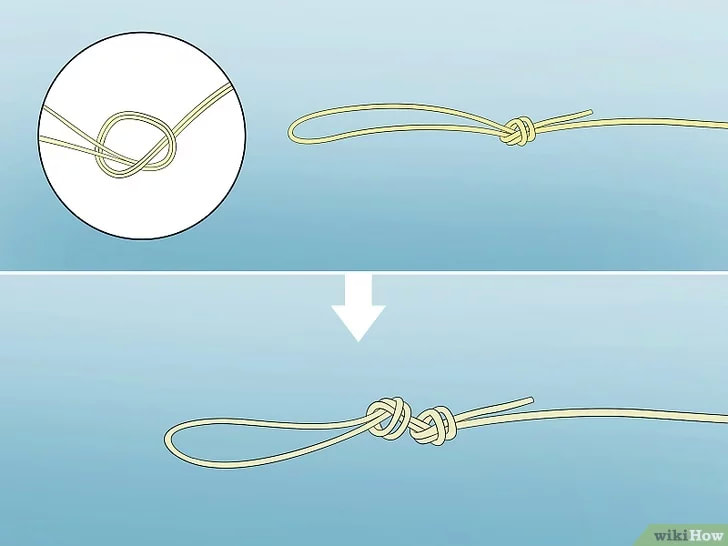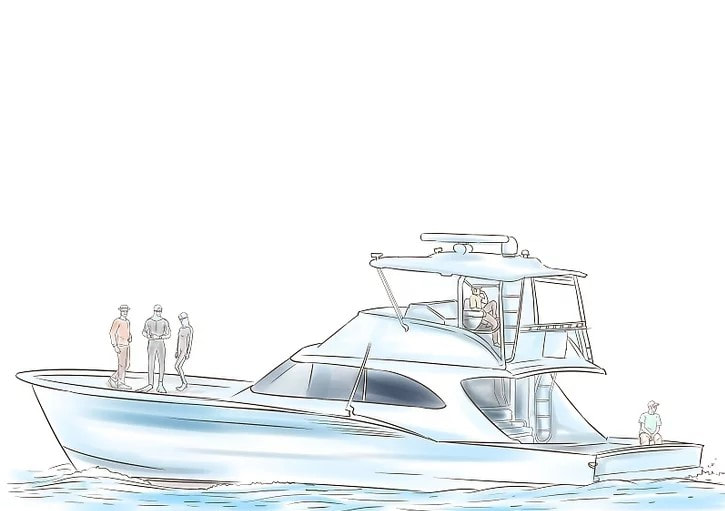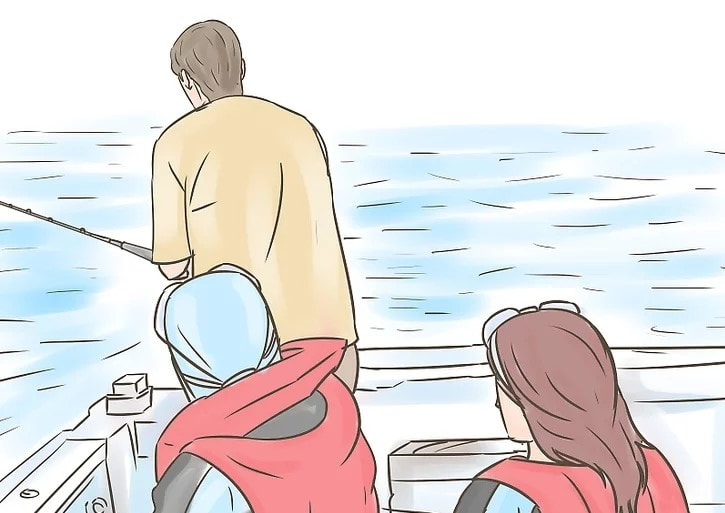Part 1 Getting Ready for Fishing
- If you've never deep sea fished before, you need to charter a boat and go out with an experienced fishing guide. Even if you've deep sea fished many times, it's much easier to fish with a guide than to try to go it alone. Let a local show you where the fish are and have fun catching them yourself.
- If you have a boat already, you need to make sure you provide all the necessary safety equipment and licensed necessary to fish. Deep-sea fishing rods and reels are generally larger and stronger than fresh water equipment, and can be rented at many seaside fishing outfitters, or from other fishermen. You'll also need a few spools of high-tensile line for fishing.
- If you're going to be out until the sun goes down, or you're going out in cloudy weather, it's also a good idea to bring some layers. It can get chilly out at sea, depending on the season, so an old hooded sweatshirt can be an invaluable clothes item, as well as some sweatpants if necessary.
- Leave cellphones, jewelry, or anything that you'd hate to lose or get wet back on shore. In the event that you get soaked, you don't want to have to lose anything valuable.
- If you already know you're prone to motion sickness, take half a Dramamine the night before and another one an hour before or so before you get on the boat. Keep your eyes on the horizon while you're out, because it's stationary and it will help you from getting motion sickness.
- It's common to drink alcohol on certain fishing trips, but make sure you supplement any alcohol you're drinking with plenty of water. In bright sun, you can get dehydrated quickly and could wake up to a serious hangover the next day if you're not careful. Not to mention that alcohol will lower your hand-eye-coordination, making you a less safe fisherman. Moderate your drinking and have plenty of water.
Part 2 Finding a Boat
- Alternatively, if you want to go it alone, you need to be wiling to share a charter with strangers, in most cases. Even if you've got a party, it's likely that there will be other fishers on your boat. Expect to mingle.
- It's also possible to walk around by the piers and look for booths that will take walk-ups. While this is more common for tours and sight-seeing boat trips, it's a good way of looking around for a good charter. Talk to people and you might be able to find a better deal.
- When you charter your boat, it's important that you find out everything you'll need to know ahead of time. What do you need to bring? Where do you need to meet up? What time? How does payment work? Make sure that you get all the details out of the way up front.
- The crew should also take care of all safety and legal regulations, on most good fishing charters. All of your questions about what fish you'll be catching, what size the fish need to be, and other considerations should be taken care of on a charter.
- Watch the weather patterns. If storms are in the area, it may not be safe to go out. Ensure you will be able to navigate the waters and keep your radio on at all times to listen to Coast Guard warnings. You also need to be projecting a positioning signal at all times, should your boat capsize.
- Practice caution when handling fish. While deep-sea fishing, you may catch large, strong fish that will generally fight a lot as you reel them in. Be sure to steady yourself so you do not fall out of the boat. Always follow directions during the capture process.
Part 3 Catching Fish
- Generally, drop-offs, trenches, and reefs are usually good places to fish, depending on the region. Reefs in particular are usually swimming with all variety of aquatic life, meaning that large game fish will be nearby.
- Tuna generally can be found near schools of dolphins, or floating under debris of any kind.
- Trolling is used to drag your line deep, along the ocean floor. This is good for shallower waters to attract grouper and smaller fish, using a weighted line to skim low along the bottom.
- Chumming is used to attract larger fish. When chumming, you'll usually leave baited lines in the water, then throw chunks of bait into the area to attract numerous fish and attempt to create a frenzy.
- Cast a line up current. When signs suggest there will be large fish in an area cast a line slightly up current, let it come back to the area and let the fish take the bait. Reel in and recast as necessary.
- Keep your lines as straight as possible, as the boat turns. Try your hardest not to cross lines with anyone. If they get crossed and someone gets a fish on the hook, you both will start reeling your lines and cause a tangle, which will be very difficult to get loose without losing the fish.
- Don't be afraid to use your instincts, especially if you're an experienced fisherman. If you really want to try fishing with shrimp, say so and go for it. It's your fishing trip. Listen to advice, but also do what you want at the end of the day.
- When keeping fish, make sure you are within your legal rights. Also be aware of conservation and not keeping any endangered fish. Put any fish you keep on ice to preserve freshness.
- Some well-known places for deep-sea fishing are Hawaii, Gulf of Mexico, Alaska, St. Lucia and Maine.
- Deep-sea fishing poses more danger than lake or stream fishing. If possible, bring an experienced person with you.




 RSS Feed
RSS Feed
